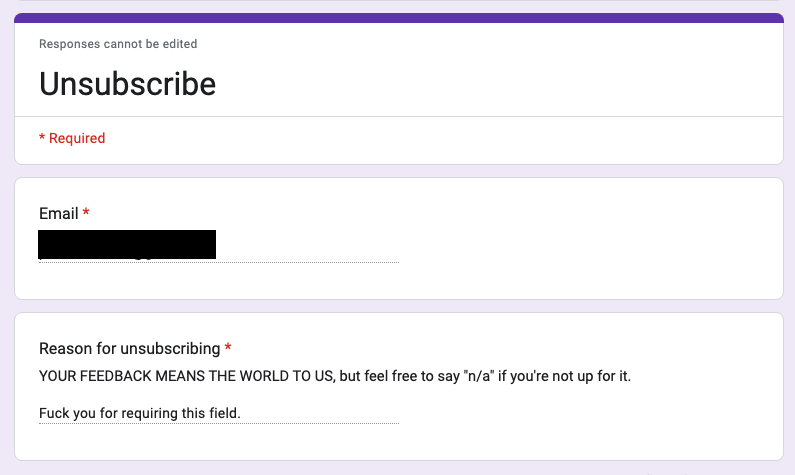Remember The Individual
Sonder
The Dictionary of Obscure Sorrows “creates beautiful new words that we need but do not yet have”. My favorite is sonder:
n. the realization that each random passerby is living a life as vivid and complex as your own — populated with their own ambitions, friends, routines, worries and inherited craziness.
Unfortunately, the internet can obscure the realization of sonder. Let me explain.
Immeasurable Impact
The promise of scale is what drew me to computer science. Software gives us the ability to impact billions of people in a meaningful way.
Take Facebook. As much as I jab at them, there’s no denying their value. It lets me reconnect with long-lost friends and nurture my existing relationships. For example, it was instrumental in forming my birthday call habit.
Its impact on my life alone is astounding - multiply that by billions of people and it’s truly immeasurable.
Does it also have negative consequences? Sure, but life isn’t black and white.
Scale Isn’t Everything
Scale is a double-edged sword. Since we can’t process that level of impact directly, we resort to abstractions such as metrics. These are lossy, though. They only tell part of the story - by only showing the big picture, they obscure the individuals that comprise it.
So while scale allows you to reach billions of people, it makes it difficult to empathize with each individual.
Consider account lockouts, a growing issue. Tech companies have systems to detect suspicious activity and freeze your account accordingly. This has value - it addresses legitimate problems such as hacking attempts on your Gmail or money laundering with Stripe. When it works, it benefits everyone.
However, if there’s a false positive, it can wreak havoc on your life. There’s no shortage of horror stories about this. Victims’ lives and livelihoods are affected by these automated systems, with little to no recourse from the corporations that put them into place.
For example, getting locked out of your Gmail is equivalent to losing your entire online life. You need it for login with Google, two-factor authentication and password resets. Similarly, having your Stripe funds frozen can be a death knell for your company. When you can’t pay suppliers or accept money, your business grinds to a halt. Often, there’s no way to reach a human representative for support, leaving you completely helpless.
Of course, this isn’t what the organization sees when they look at the metrics. All they see is a 99.9% success rate. Pretty good, they think.
But when you have a billion users, 0.1% of false positives is still 100,000 people. It may be a small percentage, but it’s large in absolute terms. The cumulative distress faced by the users is enormous.
Anyone building a product should take note. They won’t experience the pain caused by each failure - that’s only felt by the person on the other end. That doesn’t mean it doesn’t exist, though. Ultimately, it’s your responsibility to do right by your users.
Give A Man A Mask
Give a man a mask and he will show you his true face.
This effect doesn’t only apply to building products. It extends to all online interactions. We treat strangers differently on the internet vs the real world.
In the real world, we act with more civility because we connect with others. We understand them better through their tone, facial expressions and body language. As a result, we are more empathetic.
On the internet, it’s easy to forget that there’s a real person on the other side. As a result, you see more hostility. This is further amplified by anonymity, which removes the risk of confrontation. Reddit and Twitter are prime examples of the toxic behavior that stems from this.
Here’s an example I faced recently at Habit Gym. I send emails to waitlisted users notifying them of new programs. If they unsubscribe, I ask them why they’re leaving. This is the feedback I got.

To be fair, it’s a valid concern. But it also could have been said constructively. I’m sure that would have been the case in person, but I guess the internet eliminates the need for niceties.
Positive Interactions
Online interactions aren’t always negative. I just got this note after my last post. In fact, it’s what inspired me to write this one.
Hi, I am a reader from Shanghai, China.
Several months ago, I read your article about quitting Google. It inspired me a lot because I was confused after quitting my job as an English teacher at a public school, which is quite a decent job in China.
I noticed that you are publishing articles every week. I like to read them. Thanks for your sharing!
It’s a small compliment, but it made my day! When I write, I don’t normally think about the individual subscribers. This made me take a step back and remind myself why I’m doing this. I’m not here for the numbers - if even a few people learn something from my ramblings, it would have been more than worth it.
Empathy
What’s the take home lesson? Remember the individual. The person you are building for or interacting with is a human being, complete with their own desires, feelings and problems. The internet may be virtual, but the human on the other side isn’t. Treat them accordingly.
–
This post took redacted minutes to write.
Here’s why I share this data with my email list. Join us!
P.S: You can find more of my thoughts on Twitter @_suketk.